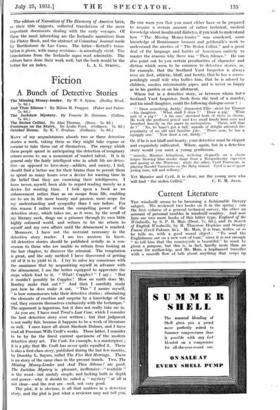Fiction
A Bunch of Detective Stories
MANY of my acquaintances absorb two or three detective stories a week, taking them as they might take cognac or cocaine to take them out of themselves. The energy which these people spend in anticipating the detection of imaginary crimes seems to me a monument of wasted talent. It is in general only the fairly intelligent who in adult life are detec- tive—as opposed to love-story—addicts, and society, I feel, should find a better use for their brains than to permit them to spend so many hours over a device for wasting time in the belief that they are exercising their intelligences. I have never, myself, been able to regard reading merely as a device for wasting time. I look upon a book as an enhancement rather than as an escape from life, enabling me to see in life more beauty and passion, more scope for my understanding and sympathy than I saw before. For this reason I rather resent the compelling power of the detective story, which takes me, as it were, by the scruff of my literary neck, drags me a prisoner through its own little highly coloured world, and refuses to let me return to myself and my own affairs until the denouement is reached.
Moreover, I have not the restraint necessary in the detective story reader. I am too anxious to know. All detective stories should be published serially as a con- cession to those who are unable to refrain from looking at the last chapter, to discover the criminal. The temptation is great, and the only method I have discovered of getting rid of it •is to yield to it. I try to salve my conscience with the assurance that by acquainting myself in advance with the denouement, I am the better equipped to appreciate the steps which lead to it. " What! Cupples ? " I say ; " But it couldn't possibly be Cupples ! How on earth does Mr. Bentley make that out ? " And then I carefully study just how he does make it out. " This " I assure myself, " is how connoisseurs take their detective stories ; eliminating the elements of emotion and surprise by a knowledge of the end, they concern themselves exclusively with the technique." The argument is ingenious, but it does not really take me in.
As you see, I have read Trent's Last Case, which I consider the best detective story ever written ; but that judgment is not really fair, because it happens to be a work of literature as well. I once knew all about Sherlock Holmes, and I have read all Freeman Wills Croft's works. These latter, I consider to be by far the finest current specimens of the modern detective story art. The Cask, for example, is a masterpiece ; it is a pity that Mr. Croft has never quite equalled it. There is also a first-class story, published during the last few months, by Dorothy L. Sayers, called The Five Red Herrings. There is no story of the same class in the present bunch. Two, The Missing Money-Lender and And Then Silence are good. The Jackdaw Mystery is pleasant, inoffensive—" readable " is the word—but unduly" simple, and lacking both in depth and power—why it should be called a " mystery " at all is not clear—and the rest are—well, not very good. - The -plot, it is obvious, is all that matters in a detective story, and the plot is just what a reviewer may not tell you: He can warn you that you must either have or be prepared to acquire a certain amount of rather technical, medical knowledge about insulin and diabetes, if you wish to understand
how " The Missing Money-lender " was murdered, some knowledge of Renaissance bronzes and goldsmith's work to understand the niceties of " The Stolen Cellini," and a great deal of the language and habits of Americans entirely to master the reasons why there was " Then Silence." He can also point out to you certain peculiarities of character and diction which seem to be common to detective stories, as, for example, that the Scotland Yard Inspector is always over six foot, athletic, bluff, and hearty, that he has a corres- pondingly small wife who bullies him, that he is adored by children, smokes interminable pipes, and is never so happy as in his garden or on his allotment.
Where but in a detective story, or between whom but a Scotland Yard Inspector, fresh from the trail of a murder, and his small daughter, could the following dialogue occur ? :
" Draw something, daddy,' demanded Ellie—short for Eleanor —his daughter. ' What shall I draw?' Draw a pig.' What sort of a pig ? " A fat one,' shrieked both of them in chorus. He took the proffered pencil and t so small heads bent over and breathed heavily on the paper in anticipation. ' There, will that do ? " No, he hasn't got a tail,' squeals of delight attested the popularity of an old and familiar joke. ' There now, he has a squiggly one.' Now draw a cat, daddy.' " Or, if he is not bluff and hearty, your detective must be elegant and exquisitely cultivated. Where, again, but in a detective story would you meet a young gentleman,
" namely, Maurice Arbuthnot, reclining elegantly on a chaise longue blowing blue smoke rings from a Bovguslaysky ciga-otte and gazing at the Watteau ; while the other, Cyril Fort eseue, is playing Handel Variations on the Baby Grand. Cyril is an ebgant young man, tall and willowy."
Yet Maurice and Cyril, it is clear, are the young men who










































 Previous page
Previous page